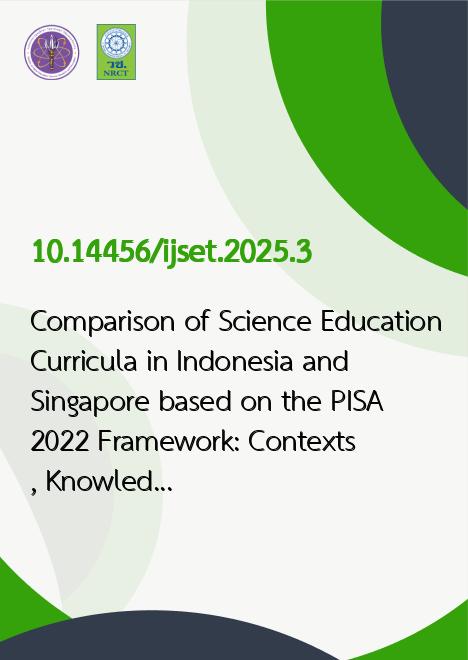
|
Comparison of Science Education Curricula in Indonesia and Singapore based on the PISA 2022 Framework: Contexts, Knowledges, Competencies, and Attitudes |
|---|---|
| รหัสดีโอไอ | |
| Creator | Farah Lailatul Nur Alifiyah |
| Title | Comparison of Science Education Curricula in Indonesia and Singapore based on the PISA 2022 Framework: Contexts, Knowledges, Competencies, and Attitudes |
| Contributor | Imroatur Rosida, Meisyka Rivani Kayla Achmad, Alvira Eka Rahel Guivara |
| Publisher | Science Education Association (Thailand) |
| Publication Year | 2568 |
| Journal Title | International Journal of Science Education and Teaching (IJSET) |
| Journal Vol. | 4 |
| Journal No. | 1 |
| Page no. | 26-42 |
| Keyword | Indonesian curriculum, Singapore curriculum, Science |
| URL Website | https://so07.tci-thaijo.org/index.php/IJSET/index |
| Website title | International Journal of Science Education and Teaching |
| ISSN | 2821-9163 |
| Abstract | The significant difference in the results of the PISA and TIMSS evaluations between Indonesia and Singapore makes it urgent to know the curriculum comparison in the two countries. This study aims to compare the curriculums of Indonesia and Singapore in terms of context, competencies, knowledge, and attitudes. This research uses the PISA 2022 framework as a reference in comparison. The method used in this research is a literature study that collects documents related to the two curricula. The data analysis technique used Creswell's 2014 analysis, collecting papers and coding to see relationships and comparisons. The results of this study are that the Singapore curriculum has advantages and completeness in every aspect compared to the Indonesian curriculum. Singapore has a more detailed and structured curriculum, leading to more consistent and in-depth teaching. On the other hand, Indonesia provides more freedom for teachers to innovate lesson design, although this can create inconsistency in its implementation. Both countries still need to strengthen the development of students' skills in scientific inquiry and experimental science to prepare them to face global challenges in science and technology. The implication of this research is the need to align the science curriculum in Indonesia with the PISA 2022 framework so that Indonesian students can be better prepared for international assessments and 21st-century challenges. |